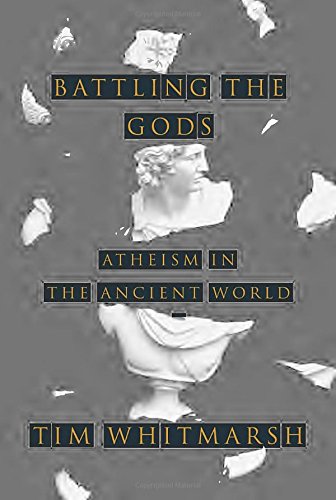David Silverman, the president of American Atheists and author of the new atheist polemic Fighting God, really doesn’t want you to think he’s a dick. Instead, he wants you to think he’s “That Pretty Good Guy Who Gets Called a Dick So Often He Gets Angry and Writes a Book About It.” (Those are his actual words). To put it in perspective, the word “dick” appears 23 times in the slightly more than 200 pages that makes up the meat of Fighting God. The word “brainwash” and its variants appear 36 times, while the “American Way” appears 13.
This is not a sophisticated book.
Which was why I was so surprised to see Fighting God receive substantial endorsements from the New Atheist establishment. “How refreshing it is to read a book that is not afraid to speak the truth, sans apology,” Richard Dawkins enthuses on the cover. According to Michael Shermer, the editor of Skeptic magazine, Fighting God “will help take our movement to national prominence and into the corridors of power where we can effect real change.” Hemant Mehta on The Friendly Atheist blog named it the best atheist book of 2015. “Not since Christopher Hitchens has someone so forcefully made the case for why we need to abandon religion,” Mehta wrote. “Firebrand atheism is alive and well.”

Fighting God: An Atheist Manifesto for a Religious World
David Silverman
Thomas Dunne Books
December 1, 2015
Silverman is not even internally coherent in his views of religion. Religion “has no positive value” because those doing good in its name are just “using religion as an excuse to do good,” Silverman writes, “and without religion these good people would still do good.” The converse—that religion might serve as a cover for evil actions—never occurs to Silverman, even though it would seem more likely. We all have incentives to chalk our good actions up to our own character rather than our metaphysical beliefs. There’s no similar incentive to take credit for our cruelties.
If religion is responsible for that which it seems to inspire, one must take the good with the bad; if it’s just an excuse we lay on top of our actions, then moral indignation at religion’s harms are unfounded. Silverman, though, wants to have his cake and eat it too. He argues that posting the Ten Commandments on public property is a hate crime since, (italics in the original) “it has inspired and still recommends the murder of [atheists] and a whole lot of other people.” Silverman never quite explains how religion doesn’t motivate any good, yet somehow incites murder based on a list that specifically tells people not to murder.
To Silverman, there appears to be a nefarious goal behind every religion and religious leader. No preacher or parent shares their faith for innocent reasons, and no religious politician acts from a place of sincerity; instead, believers are “victims of the cold and calculated brainwashing they’ve received since birth” and religion, being “too weak in premise to live and thrive without government intervention,” has “entwined itself in government” to survive.
Silverman often repeats this sentiment, but never tests it by looking at relevant historical context. Consider the treatment of Orthodox Christianity in the Soviet bloc. (My parents, who emigrated from Romania while living under a Soviet dictatorship, celebrated Christmas in secret). Religion survived not just a lack of government support, but active and brutal repression for nearly 70 years under the officially atheist Soviet government, including the execution of hundreds of bishops, thousands of monks, and tens of thousands of priests (never a moment of failure, indeed). But throughout Fighting God, Silverman never seems particularly concerned with letting facts get in the way of a good narrative or pithy one-liner.
Nowhere is this sloppiness clearer, ironically enough, than when Silverman discusses atheism. Just as Silverman relies on a caricature of religion as a malicious entity only capable of perpetuating evil, he renders atheism as big and pristine an entity as possible. Atheism is, in Silverman’s words, a “logically perfect position,” and it’s so universal that explicit theists are included amongst its practitioners. That’s right: for Silverman, if you believe in a universal spirit or a prime mover but not a personal god engaging in our lives, you are an atheist. He never explains why.
“It’s becoming clearer and clearer that there is an atheist counterpart to the religious fundamentalist—dogmatic, single-minded, and loaded with oppositional fervor.”
This leads Silverman to make some wildly inaccurate claims. He argues that more than half of Jews and three-quarters of the rapidly growing religiously unaffiliated are atheists. But according to Pew, only 17% of Jews and 33% of the “nones” say they don’t believe in God. If you want to count the “don’t knows” or “others,” that gets to about 20% and 40%, respectively, at best.
These are not small discrepancies, and based on these falsely inflated statistics, Silverman makes startlingly inaccurate claims, like that there are 80 million atheists in the U.S., a full 26% of the country. The most charitable number I could find was from Gallup, putting the number of Americans in 2014 who say they don’t believe in God at 11%. To make things frustratingly worse, other atheists have been calling Silverman out for falsely inflating the number of atheists for more than four years. And last year, I specifically asked Silverman if he would stop reporting the stats on “nones” as being representative of atheism, and he told me he would. Yet here we are.
There’s a philosopher at the UC Riverside I admire named Eric Schwitzgebel. One of his more popular theories is his theory of jerks, which he defines as follows: “the jerk culpably fails to appreciate the perspectives of others around him, treating them as tools to be manipulated or idiots to be dealt with rather than as moral and epistemic peers.”
I’m not sure if Silverman is a dick, but there’s a strong case that he’s a jerk, at least when it comes to religion. And that this book was so strongly endorsed by so many figureheads in the atheist movement is a damning indictment of New Atheist thought.
Another recent book, Tim Whitmarsh’s Battling the Gods, helps explain how we got where we are.
Whitmarsh, a professor of Greek culture at Cambridge, observes that it’s easy to see atheism and disbelief as a relatively new trend—a product of the scientific revolution and the Enlightenment. But Battling the Gods provides a rich chronology of atheism from the development of the Greek city-states to the arrival of Christianity in the Roman Empire. Atheism is “as old as the hills,” Whitmarsh writes. He’s exaggerating, but just barely.
So why is it that we think of atheism as such a modern development? Both sides of the “New Atheism” debate, Whitmarsh suggests, are complicit in this myth. For the atheist, tying one’s beliefs to science and the Enlightenment is flattering and self-congratulatory. For the believer, it’s easier to treat atheism as an abhorrent fluke or shallow fad if it’s an invention of modernity.
Why wasn’t atheism more prominent, though, If it were present through much of Greek society? Partly, the answer lies in religious suppression of heretical thought in the coming centuries, which included how history was written and what was preserved. More interesting for our purposes is a second reason: that the broader cultural attitude toward religion was different under polytheism than it is in 21st century monotheistic cultures.Today, there is a role for organized atheism—religion holds intellectual and moral authority in a way it previously hadn’t, and this provides something for a movement to organize against. Greece had no clergy or monks who were the gatekeepers to writing and learning, and priests had a very limited role. The only privileged knowledge they claimed access to was of the future, providing prophecies as oracles. There wasn’t the same sense of conflict between science and religion as there is today.
And it’s this sense of conflict, magnified to the extreme, that is the fundamental problem with Silverman’s Fighting God. It’s becoming clearer and clearer that there is an atheist counterpart to the religious fundamentalist—dogmatic, single-minded, and loaded with oppositional fervor. Fighting God makes no effort to engage with believers as full people with moral convictions and reasons for what they believe; to Silverman, believers are simply liars, or victims at best.
In a speech that appears in the book’s appendix, Silverman calls believers “marketing tools” that “will be treated as such.” That’s stunningly callous, even for Silverman. The brainwashed tool, the liar, and the victim cannot possibly function as moral or epistemic peers, and Fighting God depends on that inequality. Without taking the opposing position seriously, on its own merits, there’s no possibility of actually convincing anyone, believer or not, who isn’t already convinced. But I suspect that’s not really the point. Whitmarsh prefaces his book by saying he has no interest in proselytizing—Battling the Gods is solely a work of history, and a dense but lively one at that. He notes, however, that he developed a strong conviction as he researched and wrote the book. “Cultural and religious pluralism, and free debate,” he writes, “are indispensable to the good life.” I share this conviction.
Whitmarsh prefaces his book by saying he has no interest in proselytizing—Battling the Gods is solely a work of history, and a dense but lively one at that. He notes, however, that he developed a strong conviction as he researched and wrote the book. “Cultural and religious pluralism, and free debate,” he writes, “are indispensable to the good life.” I share this conviction.
I don’t believe in God, but I’m not on David Silverman’s team. His victories are not my victories; his atheism is not my atheism. Fighting God takes us no closer to pluralism, but instead toward a more deeply entrenched and committed brand of ideologue. This demagoguery is great for firebrand atheists and the religious fundamentalist—Silverman is a favorite foil for the talking heads at Fox News—but at the expense of the rest of us. Religion, full stop, is not the problem that Silverman and other New Atheists make it out to be. An opposition to pluralism, however, is a serious worry, whether it comes from the religious or not.
Also on The Cubit: A review of Jerry Coyne’s Faith Versus Fact






